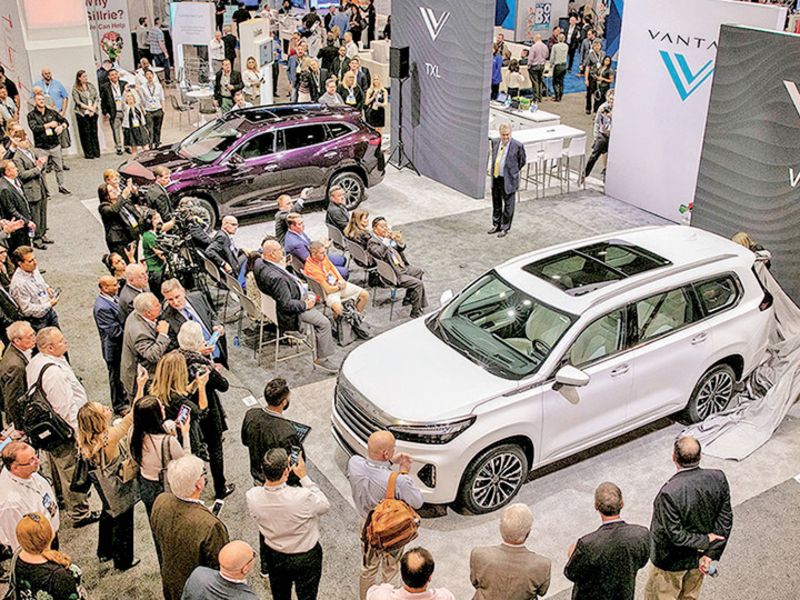
LOS ANGELES — HAAH Automotive Holdings is ending its seven-year effort to import Chinese vehicles and distribute them through a dedicated U.S. dealership network, CEO Duke Hale told Automotive News.
Hale cited tense U.S.-China relations that scared off potential investors.
The Irvine, Calif., startup will file for bankruptcy Monday after a conference call with prospective dealers, who have paid nonrefundable deposits from $100,000 to several hundred thousand dollars for franchise points in the U.S., Hale said.
“We don’t see a way forward right now for Vantas and T-GO,” Hale said of the two U.S. brands created to sell vehicles from China’s Chery Automobile Co. “There’s going to be no cars, there’s going to be no parts, there’s going to be no revenue,” Hale said of the bankruptcy filing.
HAAH pulled the plug after the investors it needed to move forward became increasingly risk averse because of tensions in U.S.-China trade relations, stiff auto tariffs and negative U.S. public sentiment toward China’s role in the coronavirus pandemic, Hale said.
Hale said that half a dozen investors had expressed interest in the HAAH plan with Chery, which is a major Chinese automaker and top exporter. But in recent months, that interest dried up. And HAAH’s previous confidence in raising the needed money dried up as well.
“All of the big investors moved away from the deal because of U.S.-China relations,” Hale said. “They do not see it as the right place to invest. Even though I didn’t want to hear it from the investors, it wasn’t hard to understand.”
He did not identify the investors.
“These were major Wall Street private equity types of investors,” Hale said. “These were the big money guys.
“I don’t have total insight into their decision, but basically the response is that China-U.S. relations are not very good, not very stable and really haven’t gotten better under President Biden,” Hale said. “Americans aren’t very fond of where they believe COVID came from.”
HAAH has raised money over the years from dealers and financial institutions, but the next critical step of finalizing a joint venture with Chery required a big infusion of cash, Hale said. Chery was making its own investments by preparing the vehicles for the U.S., Hale said, but HAAH would need to buy them.
“We always had the responsibility to raise big money — it was north of $200 million,” Hale said. “We had already raised some of the money through our bank, through our dealers, but not nearly enough to get the deal done.”
Hale, a longtime U.S. auto executive who has worked at Mazda and Volvo, started HAAH in 2014 when prospects for better relations between the U.S. and China were looking up.
The U.S. auto tariff on Chinese vehicles was 2.5 percent in the mid-2010s, and several Chinese automakers were looking at the U.S. market.
But U.S.-Chinese relations declined during the Trump administration, which imposed an extra 25 percent tariff on a variety of Chinese goods, including cars.
The trade situation worsened with the onset of the coronavirus pandemic. And now under the Joe Biden administration, the U.S. has pressed China on human rights concerns and security matters while maintaining the Trump tariffs.
“I’m not blaming Biden; I’m not blaming Trump. I’m just saying that the state of affairs is not good,” Hale said. “I can’t control the U.S.-China relationship and the effect it’s having on big investors in the deal. There’s nothing I can do.”
In HAAH’s most recent business plan, the company expected to purchase finished vehicles from Chery through a joint venture and distribute them to U.S. dealers. The retailers would pay HAAH a flat rate depending on the model and trim, then sell the vehicles to consumers at a no-haggle price.
But as the venture shuts down, dozens of prospective dealers who had signed up for about 135 sales points across the U.S. will lose their deposits, which ranged from $100,000 to $175,000 per point, depending on the market, Hale said. Most dealers had one or two sales points, but a few had as many as five.
There had been signs over the past year that HAAH was struggling.
A year ago, the startup ended a separate import deal with a different Chinese automaker, Zotye Automobile Co. Hale blamed that failure on China’s weakening auto market and Zotye’s own financial challenges due to its sagging sales in that country.
As HAAH shifted its planned joint venture to Chery, it announced plans to assemble the vehicles in the U.S., giving HAAH an opportunity to use a “Made in America” marketing pitch. HAAH never announced a U.S. assembly site after launching a nationwide search for one last year.
In April of this year, HAAH said it was switching back to the model of selling imported vehicles.
In June, HAAH confirmed to Automotive News that sales chief Bob Pradzinski, previously a Hyundai Motor America executive for 26 years, had resigned in May. Leaving at the same time was Garrett Bailey, who was vice president of strategy.
One prospective HAAH dealer, who had been an early and enthusiastic advocate for the business model, recently said he was worried HAAH was running out of money. Plans to put Chinese vehicles in U.S. showrooms seemed to be farther away than ever. HAAH originally promised the first Zotye vehicles as early as 2019.
“I’m getting disturbed that this keeps getting pushed back,” the dealer told Automotive News.
HAAH’s latest business plan was to import Chery crossovers starting in late 2022 or early 2023. The first models, according to HAAH, were to be the three-row Vantas VX, the two-row Vantas TXL and the T-GO 7. Vantas was to be a near-premium brand, while T-GO would be more of a budget brand. The U.S. brands were based on Chery’s Exceed and Tiggo domestic brands.

